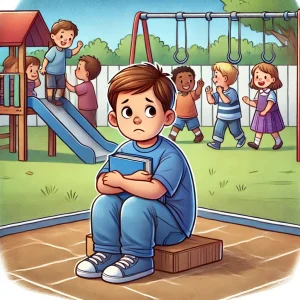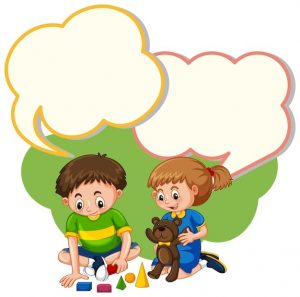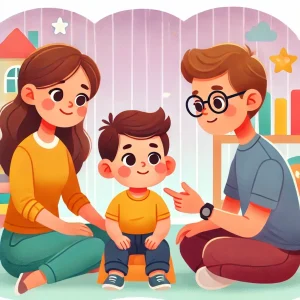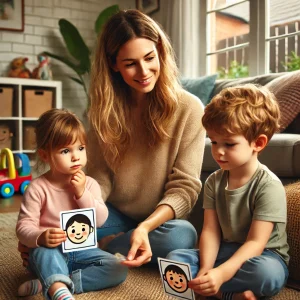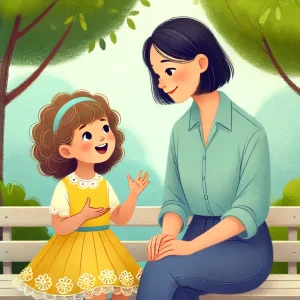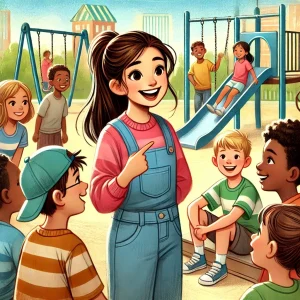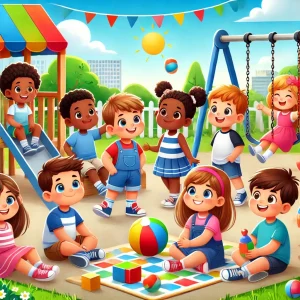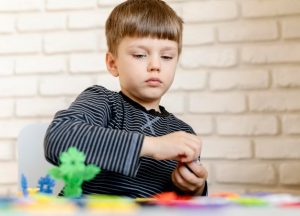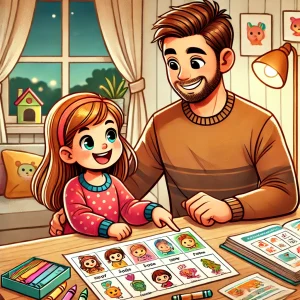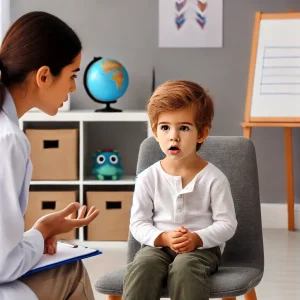Toddler Speech Development: From Babbling to First Words
By Rajini D
Last Updated: March 30, 2024
Welcoming your toddler’s first words is akin to witnessing their first steps—a heartwarming toddler speech development filled with excitement and a bit of amazement. It’s one of those unforgettable moments that parents and caregivers eagerly anticipate. The journey of language development is unique to every child, sparking curiosity about when those initial, meaningful sounds will transform into recognizable words.
As eager as we are to hear them say “Mama” or “Dada,” it’s important to remember that children’s speech development varies widely. While some toddlers start talking earlier, others might take a little more time to find their voice. This diversity in development is perfectly normal, but there are general milestones that serve as useful guides along the way.
This article is crafted to walk you through what to expect during your child’s journey to speaking their first words. We aim to equip you with knowledge and strategies to support your speech development effectively. By understanding these milestones, you can play a proactive role in nurturing your toddler’s language skills, ensuring they have the best start in their journey of communication.
Understanding Toddler Speech Development
Typical Speech Development Timelines
From the first coo to the full sentences, speech development is a progressive journey. Initially, your child’s vocalizations are simple—cries and coos that gradually evolve. By the time they hit the 6-month mark, babbling begins. This stage is vital as it marks the onset of their ability to form sounds that later turn into words.
As we approach the one-year milestone, many toddlers begin to utter their first meaningful words. While “Mama” and “Dada” often take the lead, each child’s first word is a personal victory, celebrated with joy by families. Following this, the vocabulary starts to expand, and by the age of 2, many toddlers can combine words to express simple concepts or desires, such as “more juice” or “big ball.“
The Significance of Babbling
Babbling might seem like just cute noises, but it’s the foundation of language development. It’s in this phase that toddlers experiment with sounds, practicing the mouth movements and breathing patterns necessary for speech. Think of it as the rehearsal before the big show. Encouraging babbling by responding and engaging in “conversations” with your toddler plays a crucial role in their speech development journey.
The First Words
The average age for toddlers to start speaking their first words is around 12 months, but it’s important to remember that some children may begin earlier or later. These initial words are often those they hear frequently and are emotionally significant, such as “ball,” “dog,” “hi,” and yes, the ever-popular “no.” These words are the building blocks of your toddler’s vocabulary and a clear sign that they are starting to understand and engage with the world around them through language.
In this exploration of toddler speech development, we see not just the unfolding of a natural process but the impact of nurturing and interaction. Each word, each babble, is a step towards more complex communication.
Speech Development Milestones
Let’s navigate these milestones together, keeping in mind the beautiful diversity in the pace and pattern of toddler speech development.
Key Milestones in Speech Development
- Babbling (6-9 months): The adventure begins with babbling—those delightful strings of sounds, like “baba” or “gaga,” which mark the first significant step towards speech. This stage is crucial for practicing the sounds that will soon form words.
- First Words (12-18 months): The milestone of first words is a momentous occasion, often met with excitement and joy. Around their first birthday, many toddlers begin to use simple words like “mama,” “dada,” or “bye-bye.” These words may not be clear at first, but they represent the toddler’s attempt to label their world.
- Word Explosion (18-24 months): As toddlers approach their second year, they experience a burst in vocabulary, going from a handful of words to potentially hundreds. This period is often referred to as the “word explosion,” where new words are acquired at an astonishing rate.
- Combining Words (2-3 years): The next leap in language development comes when toddlers start combining words into simple phrases and sentences, like “more milk” or “big ball.” This stage indicates an understanding of basic syntax and an ability to express more complex thoughts and needs.
Read here to learn about A Guide to Speech and Language Milestones from Birth to 7 Years.
The Variability in Speech Development
It’s important to emphasize the wide range of normal when it comes to speech development in toddlers. Some children may breeze through these milestones quickly, while others take a more leisurely pace. Factors such as environment, exposure to language, and individual differences play a significant role in how speech development unfolds.
For instance, a toddler who is an older sibling may start talking earlier, influenced by the constant chatter of a brother or sister. Conversely, a child might focus more on physical milestones like walking and running before turning their attention to speech. This variability is entirely normal and reflects the unique developmental path each child takes.
At Wellness Hub, we understand the eagerness and sometimes the anxiety that comes with waiting for and celebrating each of these milestones. We’re here to support you with resources, guidance, and the reassurance that the range of normal development is broad and varied. Each child’s journey is unique, and we celebrate the individual pace at which they navigate their path to becoming little conversationalists.
Read here to learn about: How to Know If Your Kid Needs Speech Therapy?
Encouraging Your Toddler’s Speech
As we continue our journey into supporting our little ones in finding their voice, here are some practical tips that can make a significant difference.
Practical Tips to Support Your Toddler’s Language Development
1. Embrace Communication Temptations: Create scenarios that tempt your toddler to speak. This can be as simple as placing a favorite toy slightly out of reach or pausing before offering a part of their routine, like snack time, to encourage them to use their words to express their wants or needs.
2. Model Language: Your toddler learns by imitation. Narrate your actions and your surroundings with simple language. Describe what you are doing, what they are doing, or what you both see around you. This constant exposure to spoken language is crucial for their development.
3. Give Choices: Offering choices not only empowers your toddler but also encourages them to use their words. Whether it’s picking between an apple or a banana for a snack or choosing between two toys, it prompts them to respond verbally.
4. Read Together: There’s immense value in the simple act of reading to your child. Books introduce new vocabulary, concepts, and the rhythm of language in a fun, engaging way. Even if they can’t yet speak, the act of listening is developing crucial language skills.
5. Sing Songs and Nursery Rhymes: Music and rhythm can greatly enhance language learning. Singing slows down language, allowing toddlers to pick up on individual sounds and syllables, making it a fun and effective learning tool.
6. Encourage Imitation: From animal sounds to simple words, encourage your toddler to mimic you. Make it a game, ensuring it’s fun and engaging for them. Celebrate their attempts, regardless of accuracy, to build confidence.
7. Practice Patience: Remember, every child’s development timeline is unique. Offer plenty of opportunities for your toddler to speak, but be patient and listen attentively when they attempt to communicate, showing that their efforts are valued.
Recognizing and Acting on Speech Delays
Recognizing Speech Delays in Toddlers
A speech delay in toddlers might manifest in various ways. It’s important to observe not just the absence of words but also the quality of sounds, the attempt to communicate through gestures, and the understanding of language. Here are some signs that may indicate a speech delay:
- Limited Vocabulary: By the age of 18 months, most toddlers can say about 20 words. A significantly smaller vocabulary could be a sign of a speech delay.
- Difficulty Combining Words: By the age of 2, many children start to combine two words to form simple sentences. A lack of this development might indicate a delay.
- Lack of Gestures: Before words, babies use gestures. A delay in using gestures like pointing or waving bye-bye could also signal a delay.
- Poor Understanding: Difficulty in understanding simple commands or questions can also be a sign of delayed speech or language comprehension issues.
The Importance of Early Intervention
Early intervention is key in addressing speech delays. It can significantly improve outcomes for children by providing them with the support they need to develop effective communication skills. Early intervention services can help children catch up in their speech and language development and also provide support in other areas of development if needed.
When to Seek Professional Help
If you notice signs of speech delay in your toddler, it’s important to consult with a pediatrician or a speech-language pathologist. These professionals can assess your child’s speech and language development and determine if there are any underlying issues that need attention. Seeking help early can make a substantial difference in your child’s communication skills and overall development.
- By 12 Months: Concern if your child doesn’t use gestures like pointing or waving, or prefers gestures over vocalizations to communicate.
- By 18 Months: Seek advice if your child prefers to communicate through gestures alone and has a very limited number of spoken words.
- By 2 Years: Consult a professional if your child can’t follow simple instructions, has fewer than 50 words, or isn’t starting to combine words.
Wellness Hub’s Commitment
At Wellness Hub, we understand that every child’s development is a unique journey, and sometimes, that journey includes navigating through speech delays. We are committed to supporting families with comprehensive resources, expert advice, and a community that understands the challenges and rewards of raising children. From identifying early signs of speech delays to finding the right support and interventions, Wellness Hub is here to guide you through each step, ensuring your child’s well-being and development remain at the forefront.
Supporting Your Toddler’s Journey to First Words
Watching your toddler find their voice is not just about celebrating their first words but also about cherishing the moments of connection, understanding, and love that language brings into our lives.
Celebrate Every Achievement
Remember, every attempt at communication, be it a babble, gesture, or word, is a significant step forward in your toddler’s speech development journey. Celebrate these moments, big and small, as they pave the way for more complex language skills. Your excitement and encouragement can boost your child’s confidence and eagerness to explore the power of language further.
Enjoy the Process
The process of learning to communicate is filled with trial and error. It’s a time of immense creativity and discovery for your toddler. Engage in this process with a playful spirit, understanding that each child’s path to language mastery is unique. Enjoy the conversations, the stories, and even the misunderstandings, as they are all part of building a lifelong bond through communication.
Utilize Resources Wisely
In your journey to support your toddler speech development, remember that resources like Wellness Hub are here to guide and assist you. Our website offers a wealth of information, from articles on early language milestones to practical tips on encouraging speech and understanding when to seek help. We’re dedicated to providing parents with the knowledge and support needed to navigate the rewarding challenges of child development.
Wellness Hub: Your Partner in Development
At Wellness Hub, we understand the importance of early childhood development and the role of effective communication in fostering healthy relationships and cognitive growth. Our platform is designed to be a comprehensive resource for parents seeking advice and support. Whether you’re looking for strategies to encourage your toddler’s first words or need guidance on developmental milestones, Wellness Hub is here to support you every step of the way.
Conclusion
As we draw our exploration of toddler speech development to a close, it’s essential to remember the significance of understanding and actively supporting this crucial aspect of your child’s growth. Speech development is a journey—one that is as unique and individual as your child. While milestones can offer a roadmap, they are merely guides, not strict timelines, that all children must adhere to. Embracing this journey with patience, encouragement, and a keen ear can make all the difference in nurturing your child’s ability to communicate effectively and confidently.
For those seeking further insights, guidance, and support, Wellness Hub stands ready as your ally. Our platform is rich with resources designed to assist families in fostering healthy development at every stage. Whether you’re looking for advice on encouraging your toddler’s first words or strategies for navigating challenges along the way, Wellness Hub is here to provide the tools and support you need. We invite you to visit us and explore a world where wellness and family growth go hand in hand, ensuring a nurturing environment for every child’s voice to be heard.
About the Author:
Rajini Darugupally
M.Sc., Speech-Language Pathologist (9+ years of experience)
Rajini is a passionate and dedicated Speech-Language Pathologist with over 9+ years of experience, specializing in both developmental speech and language disorders in children and rehabilitation in adults. Currently, at Wellness Hub, she thrives in a team environment that values innovation, compassion, and achieving results for their clients.
Connect with Rajini to learn more about how she can help you or your loved one find their voice.
Book your Free Consultation Today
Parent/Caregiver Info:
Client’s Details:
* Error Message
